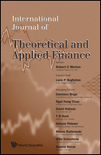
International Journal of Theoretical and Applied Finance
Scope & Guideline
Connecting theory to practice for impactful financial solutions.
Introduction
Aims and Scopes
- Financial Derivatives and Risk Management:
The journal addresses various aspects of financial derivatives, including pricing, hedging strategies, and risk management techniques. This includes advanced modeling of options, futures, and other derivatives under various market conditions. - Climate Finance and Sustainability:
A growing area of focus is the intersection of finance with climate change, examining how carbon emissions impact financial markets and the implications for sustainable investment strategies. - Portfolio Optimization and Asset Management:
Research on portfolio choice, asset allocation strategies, and the optimization of investment decisions under uncertainty is a core theme, employing both classical and modern approaches. - Stochastic Modeling and Financial Econometrics:
The journal publishes works that utilize stochastic processes and econometric techniques to model financial phenomena, including volatility modeling, option pricing, and risk assessment. - Behavioral Finance and Market Dynamics:
Theoretical explorations and empirical studies on investor behavior, market anomalies, and the psychological aspects influencing financial decisions are also included.
Trending and Emerging
- Sustainable Finance and ESG Factors:
There is a significant increase in research focused on sustainable finance, particularly the integration of Environmental, Social, and Governance (ESG) factors into financial decision-making and investment strategies. - Advanced Stochastic Processes in Finance:
Emerging themes include the application of advanced stochastic processes for modeling complex financial instruments and derivatives, indicating a trend towards more sophisticated mathematical frameworks. - Machine Learning and Big Data in Finance:
The incorporation of machine learning techniques and big data analytics into financial modeling and forecasting is rapidly gaining traction, reflecting the industry's move towards data-driven decision-making. - Behavioral Insights and Market Dynamics:
An increasing number of studies are exploring behavioral finance aspects, focusing on how psychological factors influence market dynamics and investor behavior, suggesting a shift towards understanding market anomalies. - Climate Risk Assessment and Financial Implications:
Research examining the financial implications of climate risk and the pricing of climate-related derivatives is on the rise, highlighting the growing importance of climate considerations in financial analysis.
Declining or Waning
- Traditional Economic Models:
There seems to be a waning interest in classical economic models that do not incorporate recent findings from behavioral finance or the complexities of modern financial markets. - Static Portfolio Theories:
Research focusing solely on static models of portfolio optimization, without considering dynamic factors or market changes, appears to be losing traction in favor of more adaptive and responsive frameworks. - Basic Risk Measurement Techniques:
Basic risk measurement approaches, which do not account for newer methodologies or complexities such as tail risk and liquidity risk, are becoming less frequent in published research. - Deterministic Pricing Models:
There is a noticeable decline in publications centered around deterministic pricing models, as researchers increasingly favor stochastic models that better capture market realities.
Similar Journals
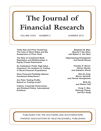
JOURNAL OF FINANCIAL RESEARCH
Navigating the Complexities of FinanceThe JOURNAL OF FINANCIAL RESEARCH, published by WILEY, stands as a pivotal platform for disseminating innovative research in the fields of finance and accounting since its inception in 1978. With an ISSN of 0270-2592 and an E-ISSN of 1475-6803, this journal aims to address contemporary challenges and trends within the financial research landscape. It has achieved notable recognition, being placed in the Q2 category for both Finance and Accounting in the 2023 rankings, signifying its relevance and impact within the academic community. Although it does not currently offer open access, the journal is accessible through various academic databases, catering to a diverse audience of researchers, professionals, and students keen on advancing their knowledge and understanding of financial systems and methodologies. With an evolving scope that encompasses empirical studies, theoretical frameworks, and practical applications, the JOURNAL OF FINANCIAL RESEARCH is committed to contributing valuable insights into the complexities of financial practices and policies.

Journal of Risk
Exploring the Complexities of Risk ManagementJournal of Risk, published by INCISIVE MEDIA, serves as an essential platform for scholars and practitioners in the fields of finance and strategic management. With an ISSN of 1465-1211 and an E-ISSN of 1755-2842, this journal explores the multifaceted nature of risk, encompassing theoretical frameworks, empirical investigations, and practical applications. Although currently classified in Q4 for both Finance and Strategy and Management categories as per 2023 standards, it provides a crucial forum for innovative research and thought leadership, addressing the challenges faced in understanding and managing risk in today’s dynamic environment. The journal, based in the United States, is committed to advancing knowledge and offering a platform for debate and dialogue in its convergence years from 2011 to 2024. Researchers, professionals, and students are encouraged to contribute their insights to enhance the academic discourse surrounding risk management.

FINANCIAL ANALYSTS JOURNAL
Advancing the Frontiers of Financial AnalysisFinancial Analysts Journal, published by Routledge Journals, Taylor & Francis Ltd, is a premier platform that disseminates cutting-edge research and practical insights in the fields of Accounting, Economics, and Finance. With an impressive Q1 ranking in three significant categories and a strong Scopus ranking, it is recognized as a vital resource for scholars, financial professionals, and students alike. The journal aims to bridge the gap between theory and practice, offering a forum for the discussion of key financial issues and innovative methodologies. As it continues to converge from 1996 to 2024, the Financial Analysts Journal remains committed to publishing high-quality research that shapes the future of financial analysis and decision-making. With no open access options, readers are encouraged to explore this influential journal to enhance their understanding and application of financial concepts.

Financial Innovation
Pioneering Insights in Financial InnovationFinancial Innovation, published by Springer, is a premier open access journal that has been contributing to the fields of finance and management of technology and innovation since its inception in 2015. With an impressive Q1 category ranking in both Finance and Management of Technology and Innovation, the journal places itself at the forefront of academic research, reflected in its Scopus rankings—#17 out of 317 in Finance (94th percentile) and #29 out of 289 in Management of Technology and Innovation (90th percentile). Centered in Germany, this journal aims to disseminate high-quality research that fosters theoretical and practical advancements within its scope, encouraging exchanges between academia and industry. The open access model enhances visibility and accessibility of published research, thus playing a critical role in shaping the future of financial practices and technology management. For researchers, professionals, and students alike, Financial Innovation remains essential for staying abreast of cutting-edge developments and trends in these dynamic fields.

Asia-Pacific Financial Markets
Exploring the Dynamics of Finance in the Asia-Pacific RegionAsia-Pacific Financial Markets is a distinguished academic journal published by SPRINGER, dedicated to advancing the field of finance research in the Asia-Pacific region. With an ISSN of 1387-2834 and an E-ISSN of 1573-6946, this journal fosters scholarly discourse on contemporary financial markets, investment strategies, and economic policy implications. Situated within the Q3 category in Finance for 2023, it ranks #140 out of 317 in the Scopus database, reflecting its growing significance and impact within the financial research community, as evidenced by its 55th percentile ranking. Since its inception in 1996, the journal has served as a pivotal platform for researchers, professionals, and students alike, featuring rigorous empirical studies and theoretical frameworks that address emerging financial trends and challenges. While it operates under a subscription model, the journal's comprehensive scope and commitment to high academic standards make it an essential resource for anyone looking to deepen their understanding of finance in the dynamic Asia-Pacific landscape.

Journal of Investment Management
Navigating the Future of Finance with Innovative Insights.The Journal of Investment Management, with ISSN 1545-9144 and E-ISSN 1545-9152, is a prominent platform dedicated to the dissemination of cutting-edge research in the field of investment management. Published by JOURNAL INVESTMENT MANAGEMENT, this journal aims to bridge the gap between theoretical foundations and practical applications, catering to the needs of researchers, professionals, and students alike. With a focus on contemporary issues influencing investment strategies, asset allocation, risk management, and financial innovation, this journal provides valuable insights and methodologies to enhance investment decision-making processes. While currently not operating under an open-access model, the journal is accessible through various academic databases, ensuring that its critical findings reach a wide audience across the globe. Emphasizing the significance of empirical research and analytical rigor, the Journal of Investment Management plays a crucial role in shaping the future of investment practices and academic discourse in this dynamic field.
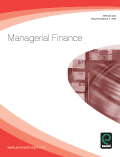
MANAGERIAL FINANCE
Shaping the Future of Managerial Finance.MANAGERIAL FINANCE is a prestigious academic journal published by Emerald Group Publishing Ltd, focused on the areas of finance, management, and strategy. With an ISSN of 0307-4358 and an E-ISSN of 1758-7743, this journal has carved a niche for itself within the business and financial sectors, achieving a commendable Q2 category ranking across multiple domains, including Business, Management and Accounting, Finance, and Strategy and Management, as of 2023. The journal aims to provide a platform for insightful research and critical analysis while fostering an understanding of contemporary financial practices and theories. With its wide-ranging scope, it serves as a vital resource for researchers, professionals, and students alike, looking to stay abreast of the latest trends and challenges in managerial finance. The editorial board is committed to maintaining academic rigor, ensuring that articles published are of the highest quality and relevance to the field. By bridging the gap between theory and practice, MANAGERIAL FINANCE is an essential reference for anyone involved in financial decision-making and strategic management.
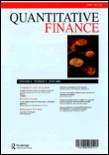
QUANTITATIVE FINANCE
Exploring innovative solutions in finance and econometrics.QUANTITATIVE FINANCE, published by Routledge Journals, Taylor & Francis Ltd, stands at the forefront of academic research in the dynamic fields of finance, economics, and econometrics. With a strong commitment to disseminating cutting-edge research, this esteemed journal, which has been published since 2001 and continues to thrive with an anticipated convergence until 2024, occupies a prestigious Q1 ranking in Economics, Econometrics, and Finance and a Q2 ranking in Finance as of 2023. It serves as an essential platform for interdisciplinary studies, aiming to bridge theoretical approaches and practical applications in quantitative methods. Researchers, professionals, and students are provided access to a wealth of high-quality articles that contribute to the ongoing discourse and advancements in these fields. As the journal continues to impact its community, QUANTITATIVE FINANCE remains an invaluable resource for those seeking to stay at the cutting edge of financial research and its applications globally.

European Journal of Finance
Pioneering research that informs financial practice.European Journal of Finance is a prestigious publication specializing in the domains of finance, economics, and econometrics, published by Routledge Journals, Taylor & Francis Ltd. Established in 1995, this journal has become a vital resource for researchers, practitioners, and students, contributing significantly to the understanding of financial systems and markets. With its Q1 ranking in the Economics, Econometrics and Finance category, it stands out for its rigorous peer-reviewed articles that explore innovative theories, models, and empirical studies. The journal's impressive Scopus ranking of 35 out of 242 highlights its impact and relevance within the field, with an 85th percentile standing that underscores its importance to current financial research. Although it does not offer open access, the European Journal of Finance remains a cornerstone for those seeking to delve deeper into the complexities of finance, equipped with insights that drive both academic inquiry and practical application.
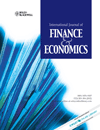
INTERNATIONAL JOURNAL OF FINANCE & ECONOMICS
Advancing Knowledge in Finance and EconomicsInternational Journal of Finance & Economics, published by Wiley, is a premier academic journal that serves as a vital resource for researchers and professionals in the fields of finance, accounting, and economics. With an impressive impact factor and a reputation for excellence, the journal is recognized in the 2023 Scopus rankings, placing in the top quartiles across multiple categories, including Q2 in Accounting, Economics, and Finance. The journal has been a significant contributor to academic discourse since its inception in 1996, with its converged years extending to 2024, thereby ensuring the continuous advancement of knowledge in these critical areas. Although it operates under a traditional subscription model, its comprehensive articles provide insightful analyses, empirical research, and theoretical advancements that cater to a diverse audience—from seasoned scholars to emerging students in the field.